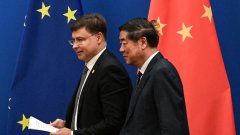In the past week, GAP's news on large -scale sales in China has been circulated on social media.According to Chinese media reports, since 2022, GAP has successively closed stores in Beijing, Shanghai, Guangzhou, Shenzhen, Changsha and other cities.
International fast fashion brands have become increasingly prominent in operating in China. Following the large -scale reduction of Chinese stores in the Swedish brand HM and the Japanese brand Uniqlo, the American brand GAP has also closed stores in at least 14 Chinese cities, causing GAP to be comprehensive in China in ChinaExclusive to withdraw from the store.
Experts interviewed experts analyzed that in the context of the Chinese economy facing huge downlink pressure, the international fast fashion brand has significantly reduced its business in China and will further crack down on the confidence of investing in other overseas investors in China.
In the past week, the news of GAP's large -scale sale in China has spread on social media.According to Chinese media reports, since 2022, GAP has successively closed stores in Beijing, Shanghai, Guangzhou, Shenzhen, Changsha and other cities.
Some netizens said that a store in GAP Hangzhou even dumped the items in the store, including 15 yuan (RMB (RMB, Same, about S $ 3) to sell fire extinguishers in the store, 200 yuan for ladder, and 100 yuan for half -person models.
Gap was established in California, USA in 1969, and entered the Chinese market in 2010.There were more than 200 stores during the heyday of China, but there were only about 150 stores left at present, and the number of stores is still declining.
denied that it was fully closed in Huamen Store
Gap China Headquarters in response to the interface fashion inquiry, "The clothing fashion industry has changed rapidly, especially in Greater China." Therefore, GAP will regularly examine its business strategy and model, including store portfolio, etc.Adjustment.
In response to Gap's rumors that can be fully closed in Huaman stores, GAP rumors said that the company has plans to open another new store in Qingdao, Shandong.
Scholars: Reflect that investors have decreased with confidence in Chinese recovery
China used to be a market for international fast fashion brands, and it is also Gap's life -saving cable.According to Guojin Securities, from 2006 to 2016, driven by the Chinese market, GAP's Asian business proportion increased from 3.9 % in 2006 to 9.6 % in 2016.But since 2018, GAP's turnover in Asia has declined significantly.Last year, it was said that Gap Group is considering potential options including the sale of Chinese business to adjust to operate in China.
In March last year, after HM and Uniqlo and other international brands were resisted by Chinese consumers due to disputes in Xinjiang cotton, the international fast fashion brand's operating dilemma in China gradually came up.As of the end of last year, HM has closed nearly 60 stores on the mainland, and Uniqlo has closed 133 stores in Greater China.In July of this year, the fast fashion brand Bershka, Pullbear and Straparius, a fast fashion brand owned by Zara's parent company, also suddenly exited the Chinese market.
Dr. Hu Dong'an, a senior economist at Oxford Economic Research Institute, analyzed in an interview with the United Zard that the international fast fashion brand quickly tightened its business and reflected from the side that investors' confidence in China's economic recovery was decreasing sharply.The fast fashion brand has a high visibility internationally. Their business shrinks, and it is expected that the confidence of investing in other international investors in China will be combated.
Cameron Johnson, partner of Shanghai Taide Avian Business Consulting Co., Ltd., believes that the impact of the epidemic is the last straw that promotes international fast fashion brands to reduce its business in China.These companies have previously faced the challenges brought about by the increase in uncertain factors in the Chinese business environment and the rapid changes in Chinese consumption habits.At the same time, the Western government demanded that the pressure on the selection stations between China and the West was increasing.
Jiang Kaiming pointed out that with the shrinkage of business in China, the international fast fashion giant will gradually turn the supply chain to Southeast Asia; then the Chinese market will be separated from the outside world.This is a preliminary representation of the Chinese economy and the West, which may last for 10 years.




